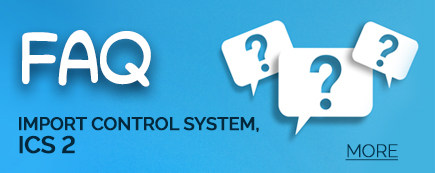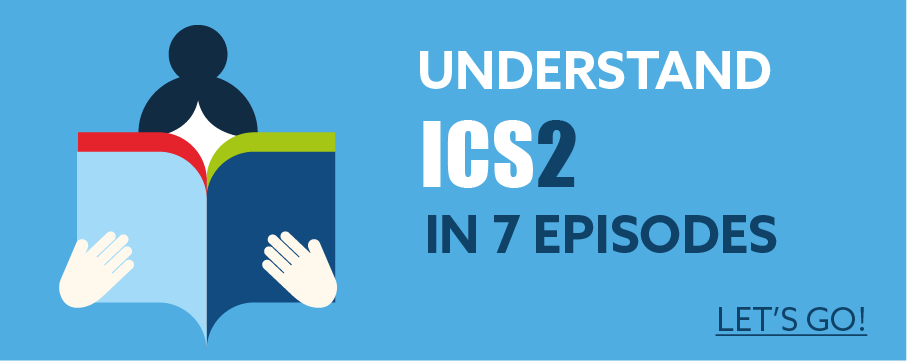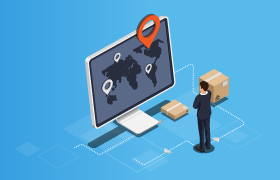SAFE via conex™ is the solution developed by CONEX to manage advance security declarations that must be lodged prior to the importation of goods into certain customs territories and countries. Our solution complies with the World Customs Organisation’s SAFE Framework of Standards. SAFE via conex™ respects the regulations of each country as well as the various communication protocols with the relevant customs administration servers.
With SAFE via conex™, you benefit from an intuitive and reliable work interface, completely freed from the technical constraints associated with the transmission of security messages. In the context of the new British customs formalities brought about by the United Kingdom's exit from the European Union, SAFE via conex™ provides a connection to the GVMS (Goods Vehicle Movement Service) and S&S GB (Safety & Security) system.

IMPORT CONTROL SYSTEM
ICS: advance security declaration for goods entering the EU customs territory.

PNTS
ANTES (FR)
.
Managing the formalities related to the presentation of goods and temporary storage.
WHO
All operators concerned by the mandatory security declaration for goods entering the European Union.
WHAT
Electronic exchanges with the EU customs administrations: Entry Summary declaration (ENS), Amendment and Diversion requests and Arrival Notification as well as the transmission of Movement Reference Numbers (MRN), Do Not Load (DNL) notifications.
HOW
Electronic exchanges via the secure CONEX communication platform - Data entry via a WEB APPLICATION, Full EDI data recovery.
SAFE via conex™ is the solution for managing safety and security declarations and exchanging electronic messages with customs administrations, within the framework of the ICS IMPORT CONTROL SYSTEM regulations.
ICS2 is the new version of ICS whose purpose is to improve the quality of security declarations linked to goods imported into the EU.

REGULATORY
COMPLIANCE
Safety / Security data coherence checks

DATA
INTEGRITY
through data transfer reducing manual data entry

CUSTOMS
TRANSIT
in connection with the CUSTOMS via conex™ solution.

INTERFACE
MOBILITY
SaaS mode application accessible on PC, tablet, smartphone.
SAFE via conex™, the answer to all Import Control System (ICS1 and ICS2) regulatory requirements.
♦ Manage security declarations upon entry of goods into the European Union territory with ease, thanks to an intuitive work interface.
- EU advance security declaration known as the Entry Summary Declaration (ENS), at the first point of entry into the EU territory (+ Switzerland, Norway and Northern Ireland for ICS2)
- Advance DSDT: Advance Summary Declaration for Temporary Storage (FR), when France is the subsequent country of entry (ICS1 only).
- MRN: Movement Reference Number
- Do Not Load
- Requests for modification, diversion (ICS1 only)
- Referral management – Request for Amendment, Information, Screening (ICS2 only)
- Arrival Notification
♦ Free yourself from the technical aspects of your electronic exchanges.
♦ Benefit from a single user interface for all your security declaration formalities.
♦ SAFE via conex™ adapts to all Supplychain economic operators in order to constitute the ENS (SINGLE OR ICS2 MULTIPLE FILING COMBINATIONS):
- The carrier, responsible for submitting the complete declaration dataset.
- Other actors, for the submission of partial datasets (Freight forwarders, transport agents, customs brokers, importers/exporters, GHAs, etc.)
The European Commission is gradually implementing ICS2 with start dates dependinICS2g on the mode of transport used (see our FAQ for more ICS2 information):
R1: EXPRESS & POSTAL OPERATORS, since March 2021
R2: AIR, since July 2023
R3: MARITIME, ROAD AND RAIL from June 2024 in 3 STEPS
ICS2 R3 – STEP 1
FROM JUNE TO DECEMBER 2024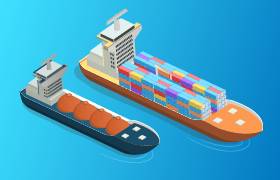
MARITIME & INLAND
WATERWAY CARRIERS
FROM DECEMBER 2024 TO APRIL 2025ICS2 R3 – STEP 2
MARITIME & INLAND
WATERWAY HOUSE-LEVEL FILERS
ICS2 R3 – STEP 3
FROM APRIL TO SEPTEMBER 2025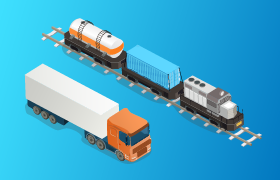
ROAD AND RAIL
CARRIERS
WHO
All the supply chain and import customs clearance operators
WHAT
Pre-customs clearance temporary storage formalities
HOW
A SaaS mode web application
PNTS, the national IT system intended for tracking goods during the temporary storage phase
- PN - presentation notification,
- TS - temporary storage.
The operators concerned:
- Carriers and their representatives
- Freight forwarders
- RDEs Registered Customs Representatives
- Importers
- Final consignees of the goods
The PNTS via conex™ solution
Manage the pre-customs clearance PNTS formalities safely and easily.
♦ PN - presentation notification,
♦ TS - temporary storage,
Less manual input with data recovered from the ENS
WHO
Carriers or their representatives responsible for filing the mandatory security declaration for any goods entering the territory of Great Britain.
WHAT
Electronic advance security declaration or ENS (Entry Summary Declaration). All modes of transport.
HOW
Electronic exchanges via Conex’s secure communication platform. Data integration in Full EDI mode or input via a WEB APPLICATION.
The United Kingdom’s exit from the European Union: new safety and security rules
S&S GB is the UK's system for managing the electronic safety and security declaration for all goods arriving in Great Britain (England, Scotland and Wales). No security declaration is required between Northern Ireland and the Republic of Ireland.
Performance and security for your declarations
The advance security declaration is sent through SAFE via conex™ to the British customs system called S&S GB (Safety and Security) between 1 hour before the arrival of the goods and 24 hours prior to their loading at their port of departure, depending on the mode of transport. Our solution guarantees the ENS declaration filing carried out in accordance with the regulations, the transmission of the MRN issued by the customs administration as well as the return of risk analysis messages, if need be, thanks to an interface available 24 hours a day.
WHO
Carriers responsible for filing the GMR for import movements from the EU to Great Britain and export movements from Great Britain to the EU
WHAT
Obtaining and presenting a GMR (Goods Movement Reference) in the context of GVMS obligations
HOW
Full Web application according to the volumes processed
The British GVMS teleservice is used to control imports/exports in Great Britain.
The references of the customs, transit and security declarations (S&S GB) of the goods carried by a means of transport must be registered there in order to obtain a GMR (Goods Movement Reference), a real “open sesame” for crossing the British border.
The road haulier is liable for this formality and must collect, as early as possible, all the elements related to the goods being transported. He/she must ensure the identification of the vehicle that will cross the border!
The GMR must indeed include the registration plates of the actual vehicle and trailer in the event of accompanied RoRo (only one GMR per vehicle, even if the lorry is empty).
WHO
NVOCC* and Carriers, in the country of exportation, both have a legal obligation to transmit separate AFR security declaration.*NVOCC Non Vessel Operation Common Carrier
WHAT
Electronic exchanges with the Japanese administration relating to the AFR Advance Filing Rules security declaration for all containerised goods arriving by sea into the Japanese customs territory
HOW
Electronic exchanges via CONEX’s secure communication platform. EDI data recovery through our SAFE via conex AFR solution. Or data entry via our Web Application: SAFE via conex AFR
HOW TO MAKE A DECLARATION WITH SAFE VIA CONEX AFR
AFR via conex™ takes care of the secure transmission of your data to Japan Customs in compliance with the regulation and the technical specifications in force.
AFR via conex™ covers all the AFR electronic messages between operators and the Japanese customs administration.
AFR via conex™, THE SURE WAY FOR YOUR SECURITY MESSAGES
AFR Advance Filing Report is the electronic security declaration management system for the arrival of goods into the Japanese customs territory. This regulation requires that a certain number of data elements be sent to Japan Customs before departure from the country of provenance. Based on this data, a risk analysis will be performed and Japan Customs will respond with either an approval or a refusal to load, eventually requesting further details.
AFR via conex™ enables operators to communicate with the Japanese administration and respects the World Customs Organisation’s “WCO Data Model” along with other international standards such as UN/CEFACT and ISO.
WHAT ARE THE ELECTRONIC MESSAGES?
Japan Customs has defined three separate messages, all of which must be filed. The first, which is based on the House B/L data, must be lodged by the NVOCC who established it (who is usually situated outside of Japan). The second, based on the Master B/L, is lodged by the carrier. The carrier must also send a declaration of the date/time of departure which must be completed after the House B/L and the Master B/L have been sent. There are 5 different kinds of electronic messages returned by customs: Response message - Registration completed message - Information discrepancy message - Risk analysis result.


